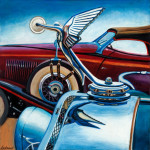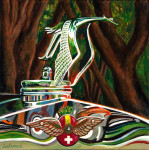Hispano-Suiza | Isotta-Fraschini
Hispano-Suiza founded in 1904, was a Spanish automotive and engineering firm, best known for its luxury cars and aviation engines pre-World War II.
Hispano-Suiza designed the first 4 cylinder 16 valve engine and the car considered to have been the first sports car, the Hispano Suiza Alphonse XIII 45 CR.
With the 1931-1938 Hispano-Suiza J12, the company brought together Swiss design, Spanish capital, and French production facilities to create what many consider the world’s best automobile of the mid-1930s. The J12 was offerred as a rolling chassis. Bodywork was to customers choice and most examples carried every luxury and convenience feature imaginable.
The mascot statuette atop the radiator after World War I was the stork, the symbol of the French province of Alsace.
Isotta-Fraschini founded in 1900, is an Italian manufacturer of luxurious and prestigious cars, as well as trucks, and engines for marine and aviation use. Their motto was “Import, sell, repair.”
Isotta-Fraschini produced one of the first cars with four-wheel brakes, and were early pioneers of overhead cam engines. They introduced the Tipo 8, the first production automobile to be powered by a straight-eight engine, at the Paris Salon in 1919 and began delivering them to customers in 1920.
The Isotta-Fraschini Tipo 8A with a 7.3 litre straight-eight engine could produce 115–160 brake horsepower .This was the most powerful mass-produced straight-8 engine in the world at that time.[3] The Tipo 8A was offered only with bare chassis and engine. Isotta-Fraschini promised that every car could do 150 km/h (93 mph). The car was very luxurious and it cost more than a Model J Duesenberg. Around one third of these cars were sold in the United States.
Film stars Clara Bow and Rudolph Valentino drove Isotta-Fraschinis, and many films of the 1930s and 40s featured these exotic cars.
Suffering from the economic crisis of the 1930s and the disruptions of World War II, Isotta-Fraschini stopped making cars in 1949. Attempts to revive the company in the 1990s failed and the company finally closed in 1999.


